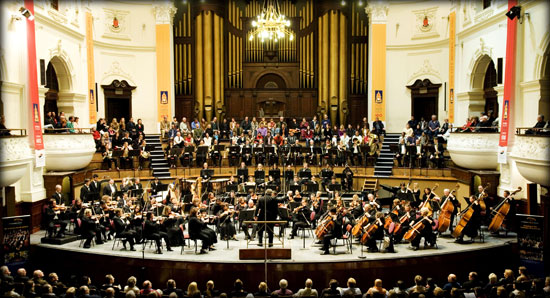Mesmerising music, lifeís symphony
By Lionel Wijesiri
ďMusic expresses that
which cannot be put into words and that which cannot remain silent.Ē
-
Victor Hugo
 |
|
A symphony orchestra
consists of a large number of musicians |
Throughout history, music of some kind had been used or expressed.
Dating back over 67,000 years, the flute is considered by most scholars
to be the oldest musical instrument.
In its purest form, music is a universal language that people of any
culture can relate to. Even if you donít understand the words, you can
appreciate and capture the spirit of the beat. This is why music has the
platform it does today, as well as the adoration and allure.
Instruments play a major role in the art of music. On principle, any
object that produces sound can be considered a musical instrument.
Today, there are thousands of instruments used to produce melodies and
sound. This is due in part to the conversion of cultures that have
influenced the design of instruments throughout history. So, what began
on the shores of West Africa as a tree stump and a hand is now known as
drums throughout the world.
Sound perception
The importance of music especially in todayís humdrum life cannot be
overstated. Today, man is surrounded by innumerable worries and
listening to music soothes his nerves. Music acts as a stimulant and
soothes the nerves. It is a fine art and groups of all ages get
attracted to its sweet sound. A person gifted with aesthetic
capabilities finds music the food for his soul.
Music is a very significant part of our life. We literally live on
music. We often choose music according to our mood. We choose high beat
trance songs when we are all pumped up, or soothing songs when we are
low. We feel the music syncing down with our mood and let it make us
feel what we want to feel. Little do we know, how music can affect our
mood and thinking, let alone our intelligence!
Psycho-acoustics is a study of sound perception. It is one of the
major studies of the effects of music on the human mind. It basically
describes how music format, starting from frequency and waveform to
genre of music, affects our mood, intelligence and even health. For
example, anyone can notice that violin tunes always feel close to the
heart. Itís because the frequency of the violin is close to the
resonance of our heart beat.
Psycho-acoustics branches out to many segments such as cognitive
neuro-science and one of its most interesting parts is the Mozart
effect. This is a proven theory of musicís influence over intelligence.
The term generated from an experiment that proved listening to Mozart
symphonies and melodies has a positive effect on human intelligence. If
a child had been listening to Mozart from early childhood, he/she has
more positive growth of intelligence than others.
A set of research results that indicates that listening to Mozartís
music may induce a short-term improvement on the performance of certain
kinds of mental tasks known as ďspatial-temporal reasoning and
short-term memory capacityĒ. Popularised versions of the hypothesis
suggest that ďlistening to Mozart makes you smarterĒ. Another set of
experiments on lab rats shows that rats exposed to Mozart music improve
their maze learning.
The April 2001 edition of the Journal of the Royal Society of
Medicine assessed the possible health benefits of the music of Mozart.
John Jenkins played Sonata K.448 to patients with epilepsy and found a
decrease in epileptic form activity. This created an impact on the whole
music scene and changed the view of considering music as just a source
of entertainment.
In fact, a growing branch in medicine called music therapy has been
rapidly gaining in popularity in recent years. This therapy claims to
speed up the recovery process of patients, whether for physical therapy
or post-operative recuperation. Listening to relaxing or stimulating
music has the capacity to accelerate the process of recovery for most
patients though, this effect is largely dependent on the patientís
response to it - henceforth, this kind of therapy is not the primary
means for recovery, but merely supplementary.
Apart from musicís health benefits, music also enhances creativity.
It has the possibility to be a muse that allows people to get their
creative juices flowing. Since music is administered to both the left
and right side of the brain, it can help spark inspiration that might
just be proving to be a little elusive. To most artistes, listening to
music can help achieve a certain creativity or ingenuity that they would
not be able to do simply on their own.
 |
|
Listening to music takes you out of
this world |
Music also has an effect in a personís performance, since it can
change moods and give more motivation to the listener. Studies show that
music does not automatically increase positive attitude, for it will
ultimately depend on the manner by which the music is played. It may,
however, reduce the strain of an activity. As a general rule, it is
important that the listener plays music he is familiar and comfortable
with, in a volume that is not too loud so as not to distract the
listener.
Tips
There are many other variables that contribute to the effects of
music, but there is certainty in the fact that music has an effect on
humans and therefore, an effect on task performances. Generally however,
the effect of music has usually been more on the positive side than the
negative. So pop on your earphones, listen, and observe your performance
levels increase!
To really enjoy good music of any genre and harness these relaxing
effects, we must really listen to it.
Here are a few tips:
*Try closing your eyes and imagine colours or try to picture the
music with your current life setting for an appropriate situation. Use
your emotional interpretation to intuit what the composer tried to
express, try connecting with the composerís reality. Youíll be
astonished to find out how music alone can form pictures in your head
without the use of any words.
*All music, with a few exceptions, is based on repetition, variation
and new melodies. Even if you canít enjoy the music, you can always try
to see how those principles are applied. Doing this might help the music
ďclickĒ.
*Use headphones if youíre with people who you donít want to disturb,
or at night. Just donít use them when driving!
*Listen emotionally. That is, let your feelings and moods change as
the sounds you hear change. Do not listen to music too loud. It can be
tempting to do so, and indeed often challenging not to, but it can and
eventually will damage your hearing.
Music, like any other art form, comes with quality; all music is not
subjected to meet the same standards. You may not be able to listen at
first. Do not give up! In time, you will begin to hear a pulse (rhythm),
melody and harmony.
When you listen to music with a high level of understanding, you
canít help but be actively engaged in the process and its outcome. You
canít help but marvel at the true genius of the master composers. And
you canít help but grow as a sensitive human being.
|

